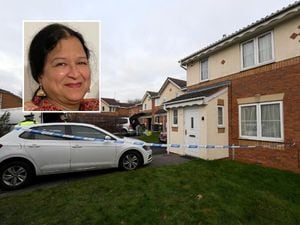Christina Edkins: Public still 'at risk' from freed criminals years after schoolgirl's killing
The public is still being put at risk of harm by violent criminals with mental health problems being released from prison, a damning report into the killing of Black Country schoolgirl Christina Edkins published today has found.

An independent investigation found the NHS, police, local authorities and prison service are still letting prisoners on the streets without adequate 'support and supervision', which has been described as an 'extreme concern' by report authors Niche.
It comes more than four years after the 16-year-old Leasowes High School student was stabbed to death on a bus by paranoid schizophrenic Phillip Simelane - just weeks after being released from jail.
The report - which refers to Simelane as 'P' - has made 25 recommendations across the public sector but says 'many of the same' failings highlighted in a previous NHS investigation in 2014 are still ongoing.
These include failures to share information about people with mental health problem and assess their needs properly.
The investigator's main recommendation is for the Department of Health, NHS England and Ministry of Justice to 'strenuously' work together to improve the care of prisoners with mental health problems in and outside of custody.
Report author Kiran Bhogal said Christina had 'paid with her life' for 'multi-organisational failings'.
She added: "The fact there there remains a risk that htese vulnerable prisoners continue to be released from prison without adequate support and supervision leaving them and the general public at risk is of extreme concern.
"We can but hope that in addressing these points, the failings identified in this and other homicide investigations are not repeated and that families do not have to suffer the pain and anguish of losing loved ones."
The latest report, which says a similar attack was now 'less likely', was today criticised by Christina's family who said reading the report had been 'extremely hard' and 're-opened wounds'.
In statement, they said: "What makes it even harder for us is hearing and reading continuously that 'lessons need to be learned' whilst knowing that in reality very few lessons have been learned and, over time, little has actually changed.
"We challenge strongly the statements that the homicide of Christina was not predictable...That P increasingly presented a danger to the public and would eventually commit serious harm or even murder was clearly apparent."
Swaziland immigrant Simelane - who lived in Sandwell and Walsall - boarded the number 9 bus on the morning of March 7, 2013 before stabbing Christina.
He had been released from HMP Birmingham on December 13, 2012, but healthcare bosses did not know he was leaving prison or where he was living.
He admitted manslaughter and was detained under the Mental Health Act in October 2013 over Christina's killing.
He had a history of violent outbursts, including making threats of murder against his mother.

The report states: "The largest concern shared by all on the investigation panel and many of the people we interviewed was that despite these efforts, the challenges to ensure appropriate after care on release for prisoners with mental health problems remain.
"If we were able to make just one recommendation to improve services and reduce the likelihood of such a tragic case happening again, it would be that national services concerned strenuously work together to improve the care and aftercare of prisoners with mental problems.
"Despite this we also want to recognise, not just the individual service efforts made to address the findings of the initial investigation report, but also the other wider changes made to services across the West Midlands that we hope will lead to earlier detection and access to more appropriate and timely intervention for offenders with mental health problems."
Nick Moor, director of report author Niche, said: "It was evident through our investigation that over time there had been systemic failures within multiple services and by some professionals to correctly assess and identify P's increasing risk of dangerousness.
"This was compounded by other factors. Alongside being quiet and shy, P concealed and denied his mental health problems when assessed. Many of the services in contact with P failed to obtain and review other information in order to build a more comprehensive picture of P. This led to a failure to properly assess and meet his needs, in particular the lack of supportive mental health care upon his release from HMP Hewell or HMP Birmingham."
Dr Andrew Coward, who chairs Birmingham South Central Clinical Commissioning Group, made a statement on behalf of the whole NHS.
He said: "Apologies cannot bring back lives tragically lost but can be a starting place to genuinely acknowledge the systematic failures within multiple organisations to correctly assess and identify P's increasing risk of dangerousness, which meant that the 'homicide of Christina by P was directly related to his mental illness' and it was 'more likely that the homicide might have been prevented if his mental health needs had been identified and met."
The initial CCG report from 2014 reported said Simelane's attack on Christina was preventable, but not predictable.
However, in the latest inquiry the authors, while agreeing Christina's death was not predictable, said that it was predictable that Simelane 'was at significant of reoffending, and that this would involve an act of violence.'
It continued: "We believe that this would have been directed at a family member, most probably his mother. That he would attack a stranger was not predictable".
In a statement, Simelane's family said: "The second investigation has been good; it got to the depth of the 'how's' and what next but it left the essential 'whys'. Thank you to everyone who took part in these investigations.
"Our son was discriminated against by the system that was put in place to protect him.
"The mother's cry was not heard or taken into consideration until innocent lives were impacted upon - one totally destroyed, the other changed in a significant way forever.
"We make a heartfelt plea to the Government to tale measures to ensure corrective systems and procedures are put in place immediately to prevent the continued re-occurrence of these tragic incidents. We also plead with the Government or parliament to sincerely look into changes that need to be put in place to prevent losing lives and the destruction of our children's future."





